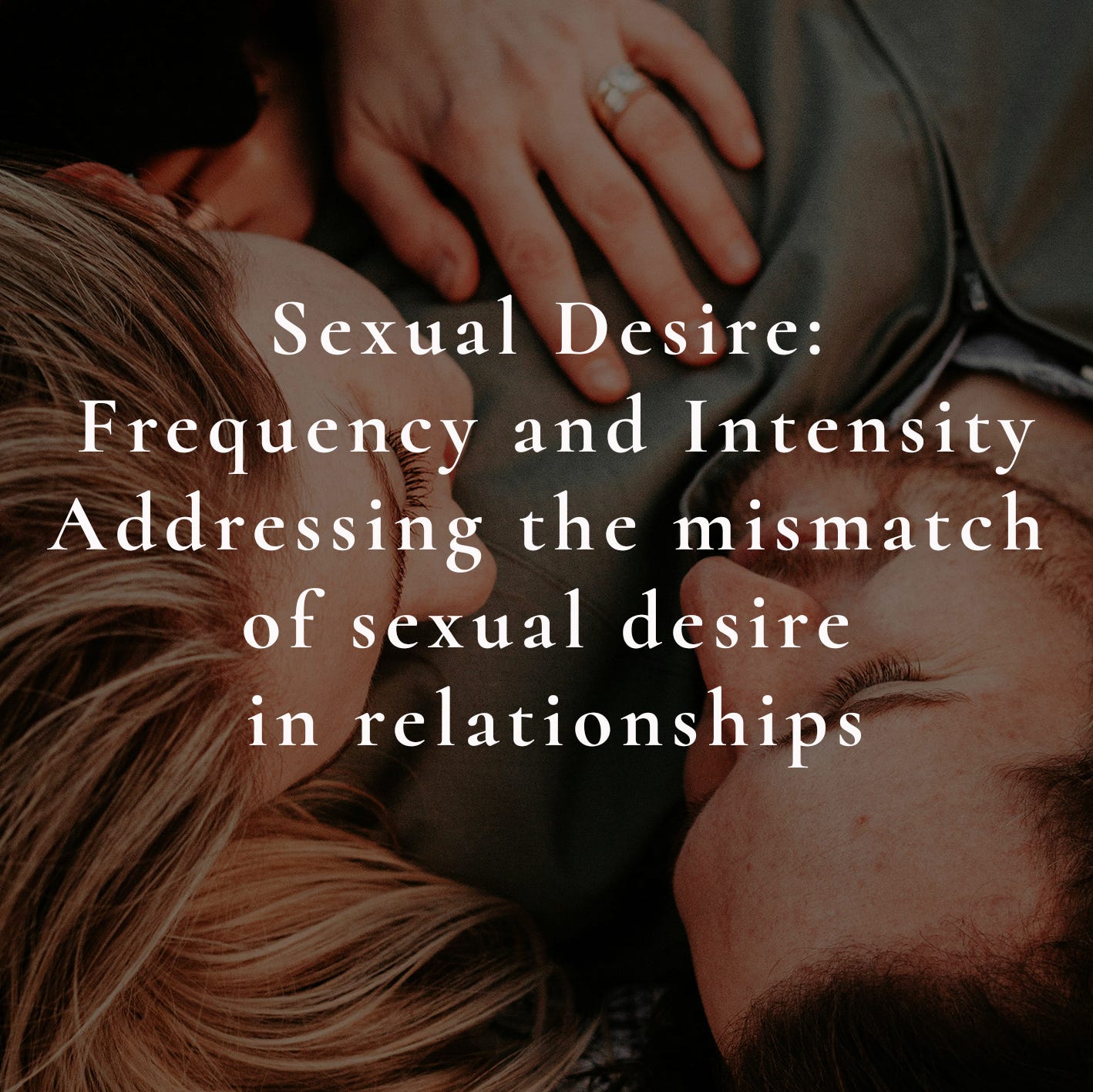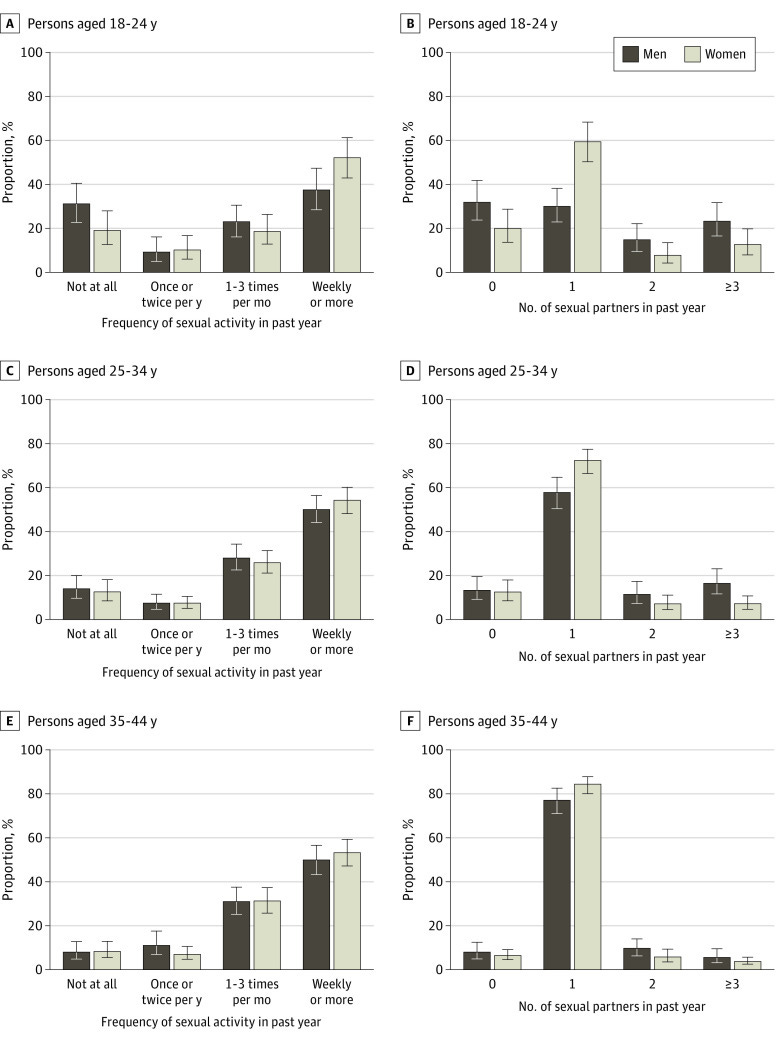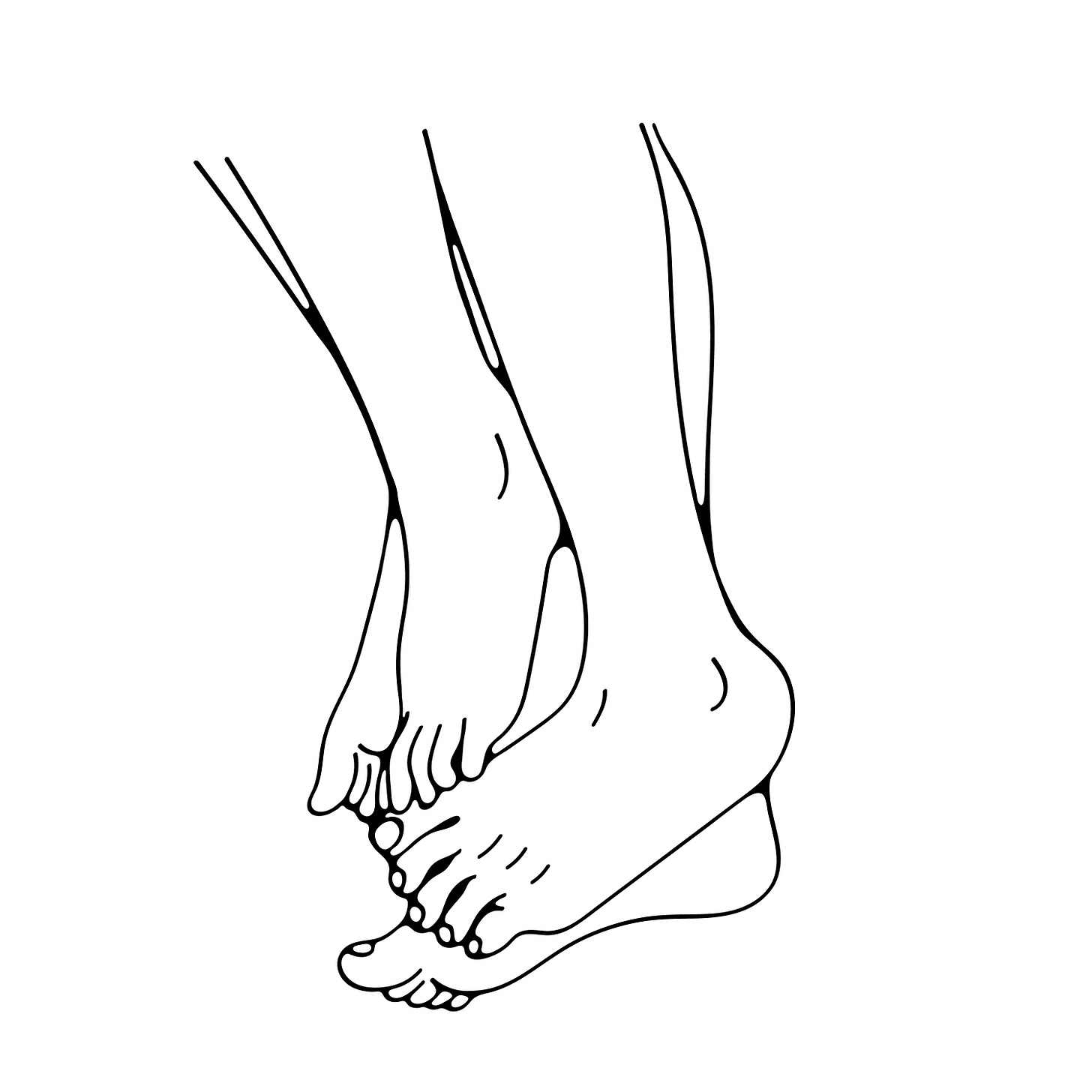Sexual Desire: Frequency and Intensity
Addressing the mismatch of sexual desire in relationships
Welcome to my 11th post! Covering the fields of psychology, science, art, and history, I have a deep desire to understand the complexity of the human mind and behavior. My posts are free and educational, but if you consider a paid subscription, I will be more than grateful. While I have based this article mostly on my own research and observations, I have used information from a variety of sources for reference, as you will find below. However, please be kind with gaps or shortcomings. Read it at your own pace and enjoy this moment of solitude and self-reflection.
“The privilege of a lifetime is to become who you truly are.” C.G.Jung
If you enjoyed my post, *Wink* once. *Wink* twice while subscribing and supporting me in writing more & better. *Wink* trwice if you want to offer me a coffee. :)
Sexual desire alignment
As a drive state and a biopsychosocial phenomenon, desire is a natural, exciting, and fascinating part of being human. Sexual desire is the degree of will directed toward action. A relationship's success can also be evaluated by how well the partners' sexual desires align. In the event of a mismatch of sexual desires, we can bridge the gap by acquiring the necessary knowledge to meet our own needs. On occasion, the disparity is too great, and we must determine which aspects are acceptable to negotiation and which are not.
After finishing Impulse: The Science of Sex and Desire a few months ago, I let the pieces of the puzzle fall into place until I came again across this book among others on my shelf; I flipped through it and highlighted the sections that I thought were most relevant to my current research Sexuality. This topic about the construct of sexual desire just fell into my lap, and I've made some connections and begun writing, as I know this is clearly an issue in romantic relationships.
Before we get into the topic at hand, I would like to provide a simple definition of a compatible relationship that I found in Franz Ruppert's book Symbiosis and Autonomy (such a precious author) there is a quote that explains clearly what a healthy couple relationship is and how it manifests itself:
"Healthy couple relationships are about more than just satisfying symbiotic needs; they also involve an ongoing growth of independence, one's own areas of interest, and shared development throughout stages of life. These stages have the potential for conflict, but they also provide many opportunities for constructive solutions."
Although there are many other needs in a romantic relationship besides satisfying one's sexual desire, it is a crucial one, and being in an incompatible relationship can have negative effects on one's sense of self-worth, self-image and sexual expression.
Why do we desire?
The concept of desire is multifaceted; the term desire refers to wanting something, but this wanting is not simple; there are degrees of wanting for as many people on this planet, and we are all unique and we all want something. We have so many desires that philosophy has written for centuries about this vast subject, from longing to resources to purpose and success, etc.
Our many desires for closeness, beauty, sex, food, money, family, and friendship can be unhealthy or problematic at times, and we can only address them if we understand them. Though needs and desires are sometimes confused, needs are things you cannot survive without, such as food, water, or air. Something that will make your life better but that you may not absolutely need is a desire. Regardless of your needs or wants, a desire is something you wish to possess.
Sexual desire, like many other aspects of human behavior, is influenced by society; it is not solely biologically driven by hormones and mating rituals; we learn to desire, and as a result, it also becomes a cultural construct.
The idea that desire is based on a "lack" is a cultural construct.
We may have learned that we lack something, that we desire things that others desire, and maybe we are motivated to fill that societal need. As a result, much of what we desire is based on our perceived desires and what others have.
Our current cultural trend in romantic relationships emphasizes that our partner should be able to meet all of our needs, when we actually need a whole community, not just one "soul" mate on whom we can place all of our needs and desires. Friends, family, and non-romantic people in our lives all play important roles, as does our therapist if we need to vent somewhere neutral. We cannot place all of our needs on one person; it is just not sustainable.
Sexual desire appears to be influenced by social pressures. We live in a society that values the ideal body image, and we learn to desire what the majority believes we should want. We sell everything by displaying sexy bodies; we can associate the desire for the object, such as a motorcycle, a face cream, furniture, or food, next to a sexy body; our desire for the sexy body, whether female or male, is linked to the objects we think we must possess.
Completing the "lack" that we are constantly told we have. Sexual desire consumes a large portion of our time; we are constantly concerned with how we look, smell and what we wear in order to be sexually desired. The act of sex actually takes up a small fraction of our time when compared to the time and money we spend being sexually desired.
We must first understand ourselves in order to form compatible relationships and make reasonable, clear requests based on our self-search or learning about what we really desire. It is hard work, but it's one way to improve your overall life for yourself and those around you. So, here are some thoughts on sexual desire and how to deal with mismatches, if there are any:
The mismatch is a common issue in relationships, here's why
One person may desire more sex, while the other may not feel the same sexual intensity or daily drive.
Just because two people in a relationship have an intensity and frequency mismatch does not imply pathology or a sexual health issue. This can be a situational issue or context; there are times in life when we are stressed or have other things on our minds. Because sexual desires and attitudes vary greatly between people, a mismatch is not surprising; this is a common problem in relationships.
"According to one study 80% of couples experience a mismatch in desire with their partner in the past month. There are also gender differences in attitudes toward sex".*
If one partner has a lower libido, they may feel sexual pressure and fail to live up to expectations, while the other, who has a higher libido, may experience rejection. This dynamic can have an impact on our self-esteem. When we don't feel wanted, it can lead to questions about how we handle situations where our sexual desires don't align. For some, it's waiting to see if things improve, while others struggle with asking the right questions out of fear of rejection or insecurity. Anger, resentment, and fear can build up if these emotions are not dealt with. We may even consider adultery or vengeance if we don't feel any sexual desire from or for our partner.
How to Address the Mismatch of Sexual Desire Frequency
If we want to sustain our relationships, we should consider working on our sex negotiation skills. This means that we can learn at any time about our sexual desires or what they are not, so we can determine whether we desire sex, need comfort, or are simply sad and don't know how to cope.
If we know about ourselves that we enjoy sexual novelty, being around someone who values predictability may be difficult or even incompatible for a long term.
These are the things we can learn early on in our dating lives, or we can simply negotiate our relationship if it is truly compatible in other areas.
One problem is that couples frequently fail to acknowledge the significance of particular sexual topics in each other's lives. Therefore, they don't bring up these acts; instead, they push their partner to do them, frequently with nonverbal cues like gestures or indications, and not explicit.
This example causes a certain amount of frustration, which can then cause resentment or hesitant behavior. Finding a compromise in sexual activities where both partners feel fulfilled and their desires are not criticized is essential to a successful relationship. We may have many secretive desires that we would like to voice, but we are afraid of being identified with them. Shame or even disgust consumes us. As I mentioned earlier, however, sexuality is actually our playground, where we can express our deepest desires or learn how to get there at any time.
If we feel less sensual, unsexual, or inadequate in our relationships, we might not be in the right ones. We can also be honest and see if there is a conversation going on about your desires.
Matched sexual desires—the frequency and intensity of sex activities at the same time—are rare.
It is always a good idea to start a conversation with something positive that you enjoy or care deeply about. Explain why it's important to you. Choosing the right time for such a conversation is critical to communication; it should take place when both people are fresh in mind and have mental space for it, rather than in a hurry or after a long day at work.
It is best not to sabotage the discussion by blaming, manipulating, or controlling the other, as this will force them to do what we want. Any couple experiences mismatches, which are completely normal; however, you can strengthen your relationship by giving the term "conflict" a new meaning, namely, that only through "conflict" do we grow into our relationship, not through avoidance.
Too much sex, to little sex? The question should be how much desire is normal and healthy.
Desire levels, measured in terms of both libido and arousal, may change over time, from one partner to another, or even from one week to the next. As a static concept, "normal" amounts of libido are impossible to pin down. No one has a "normal" or "correct" level of sexual desire; each individual has to find their own sweet spot.
As for how much sex is too much sex, that is a whole other topic, but in any event, if there is a very low desire for sex or a very high sexual urge, this may be a condition and should be handled in medical health counseling.
Researchers in this study found that pornographic media consumption was correlated with a reduced likelihood of sexual inactivity in both sexes, which provides some useful information about the average normal frequency. You can read more about this study here, it is very intriguing.
You should always take into account your life stage, any stressors you may be experiencing, whether you are married or not, and whether you are involved in any academic pursuits. There are many factors to consider before establishing a standard for "normalcy," and what is not, so you should do you: assess your current level of sexual desire and use that information to determine if anything is amiss.
I want to leave you with a thought at the end of this article that we can consider if we are experiencing toxic patterns in our relationships: some relationships lack love and feel the need to suffer together; those relationships may be symbiotic, relying on being dependent on the other. It can represent the illusion of love or the fear of losing control.
Intimacy can be frightening; perhaps as children, we were undernourished, and now as adults, some of us may accept everything we are not given in a relationship, resulting in an empty feeling and a lack of satisfaction.
That is why it is critical to understand how we love and why we are drawn to others, as well as what we truly gain from those relationships. Also, we need support, more then self-help, so look for people with whom you can communicate or who can hear you clearly.
"A sexuality in a healthy state is neither possessive nor submissive, nor is it demanding like an infant. It finds corporeal union with another individual to be pleasurable and enjoyable whether it is male or female."*
If you enjoyed this article and found it useful, Buy Me a Coffee so that I can write more and better. I thank you! <3
Resources:
A biopsychosocial approach to women’s sexual function
https://plato.stanford.edu/entries/desire/
J GILES - Journal for the Theory of Social Behaviour, 2008 - academia.edu
*Symbiosis and Autonomy-Franz Ruppert: In it he explores the relationship between our symbiotic interconnectedness and our ability to be autonomous in our lives.
Impulse: The Science of Sex and Desire
Books I've recommended for anybody interested in learning more about the dynamics of relationships and sexuality in general.







